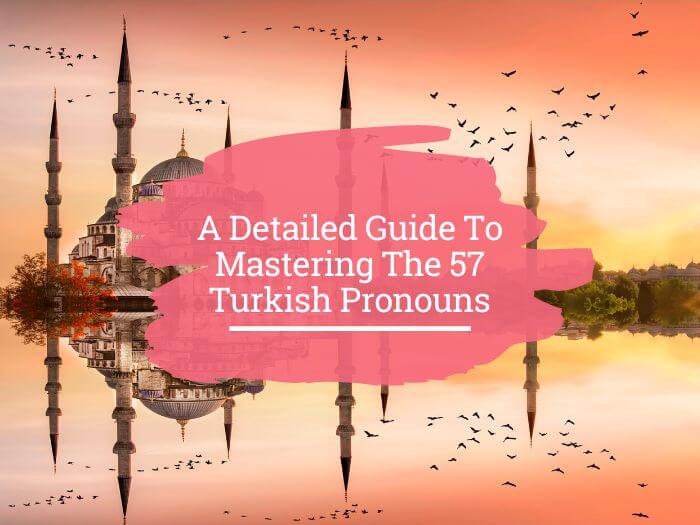If you’re thinking about learning Turkish, then you might be preparing yourself to learn a lot of vocabulary referring to a variety of things.
But there are also words in Turkish that don’t always refer to just one thing, such as Turkish pronouns.
As a quick reminder, pronouns are words that act as a replacement for a person or another agent in a sentence.
For example, words like “I”, “you”, “it”, “themselves”, and “everyone” are all pronouns. They’re one of the building blocks for forming and speaking in sentences.
Even if they seem daunting at first, Turkish pronouns are easy enough once you get the hang of them. So read on to get a rundown of the different pronouns in Turkish and how to use them in daily life.
Pro Tip
By the way, if you’re trying to learn Turkish, I’d recommend that you look into Turkish Uncovered. It’s a course where you’ll be able to adopt the unique StoryLearning® approach to learn Turkish through stories, and not through rules or drills. It’s fun, easy, and effective!
If you’re ready to get started, click here for a 7-day FREE trial.
Table of Contents
Pronouns In Turkish And English

But before jumping into the different kinds of pronouns in Turkish, it’s important to know that not every language uses pronouns in the exact same way.
In fact, Turkish pronouns function very differently from pronouns in English – and sometimes don’t even appear at all!
One specific feature of the Turkish language is key to mastering pronouns in Turkish: suffixes.
Turkish depends on suffixes for building sentences so much that they’re the reason that you’ll often hear sentences without pronouns, even if they’re implied in meaning.
For example, take the following sentence:
- Mutluyum. (I’m happy.)
The sentence is made up of two parts: Mutlu, which means “happy”, and –(y)um, which is the suffix used at the end of a word to denote the first person singular, or “I”.
The sentence doesn’t have any pronouns in it, but you can infer that this means “I’m happy” because of the suffix -(y)um.
This doesn’t necessarily mean that you can’t include a pronoun in the sentence. You could also say the same sentence while including the pronoun for “I”:
- Ben mutluyum (I’m happy)
But grammatically speaking, you don’t have to have the pronoun ben (I) at the beginning of the sentence, and the sentence can stand along without it.
In some cases, you might include a pronoun in the sentence to emphasize the subject associated with the pronoun.
Here’s an example of how this might work in dialogue:
- Siz mutlu musunuz? (Are you (plural) happy?)
- Arkadaşım mutlu değil, ama ben mutluyum. (My friend isn’t happy, but I’m happy.)
Even if the sentence isn’t grammatically incorrect without the pronoun ben (I), including it helps emphasize a contrast between the arkadaşım (my friend) and ben (I).
While this might be hard to wrap your head around at first, don’t worry! The nuances of when to and when not to use pronouns in sentences will come with practice.
And in any case, there’s nothing wrong with choosing to include the pronouns when you speak yourself. Just remember that you may hear native speakers omit them in regular speech.
Turkish Pronouns: Personal Pronouns

Personal pronouns are the pronouns that refer to people. In English, these include pronouns for the subject of a sentence (“I”, “you”, “he”, “she”, “it”, “we” and “they”), and pronouns for the object of a sentence (“me”, “you”, “him”, “her”, “it”, “us” and “them”).
Turkish has six personal pronouns: ben (I), sen (you), o (he/she/it), biz (we), siz (you (plural)), and onlar (they).
Unlike English, Turkish doesn’t have gendered pronouns, so uses o (he/she/it) or onlar (they), to refer to male, female, and genderless third-person subjects.
Another trick to personal pronouns in Turkish is the use of siz (you (plural)). Although you should always use siz to refer to multiple people in conversation, it’s also often used as an honorific form of sen (you).
Perhaps you’re speaking with someone who is your senior at work, or your teacher, or someone who is visibly older than you. In all these situations, you’d want to refer to them using siz instead of sen as a sign of respect.
If you’re looking to use these personal pronouns as the object of a sentence, then all you need to do is add an object suffix after the pronoun.
All you need to do is add the –ı/i/u/ü suffix depending on the preceding vowel based on the rules of vowel harmony in Turkish.
Here’s a simple summary of how to use personal pronouns in Turkish:
| Person | Subject pronoun | Object pronoun | |
| Singular | |||
| 1st | Ben (I) | Beni (me) | |
| 2nd | Sen (you) | Seni (you) | |
| 3rd | O (he/she/it) | Onu (him/her/it) | |
| Plural | |||
| 1st | Biz (we) | Bizi (us) | |
| 2nd* (honorific) | Siz (you) | Sizi (you) | |
| 3rd | Onlar (they) | Onları (them) |
And here’s an example sentence using personal pronouns that you’ll likely hear all the time in Turkish: (Ben) seni çok seviyorum (I love you very much).
Turkish Pronouns: Possessive Pronouns

Possessive pronouns help you identify the owner of an object without having to repeat the name of the noun over and over.
In English, there are two types of possessive pronouns: the possessive pronouns that are used together with another noun (“my”, “your”, “his”, “her”, its”, “our”, and “their”), and possessive pronouns that can stand on their own (“mine”, “yours”, “his”, “hers”, “ours”, and “theirs”).
In Turkish, there’s no difference between these two types of possessive pronouns. They are: benim (my/mine), senin (your/yours), onun (his/her(s)/its), bizim (our/ours), sizin (your/yours), and onların (their/theirs). For example:
- Ahmet benim arkadaşım (Ahmet is my friend.)
- O gömlek benim (That shirt is mine.)
One thing to watch out for is that nouns that come after a possessive pronoun must include a suffix that relates back to the pronoun in Turkish.
In English, you might say “my book”, or “your phone”. In Turkish, however, you would need to add a suffix after “book” or “phone” that refers back to “my” or “your”.
For example, if kitap means “book” and telefon means “telephone”, then you would say the following for:
- Benim kitabım (my book)
- Senin telefonun (your phone)
Because of these suffixes, you could understand that kitabım means “my book” and that telefonun means “your telephone” even without the possessive pronouns benim (my) or senin (your) preceding these words.
| Person | Possessive Pronoun | Possessive Pronoun Suffix | |
| Singular | |||
| 1st | Benim (my/mine) | -ım/im/um/üm | |
| 2nd | Senin (your/yours) | -ın/in/un/ün | |
| 3rd | Onun (his/her(s)/its) | -ı/i/u/ü | |
| Plural | |||
| 1st | Bizim (our/ours) | –ımız/imiz/umuz/ümüz | |
| 2nd* (honorific) | Sizin (your/yours) | -ınız/iniz/unuz/ünüz | |
| 3rd | Onların (their/theirs) | -ı/i/u/ü |
Turkish Pronouns: Demonstrative Pronouns

Demonstrative pronouns are the pronouns we use to point to specific people or things and demonstrate their location in relation to the speaker, like “this” or “that”.
In English, you can separate demonstrative pronouns into two different categories:
- pronouns that demonstrate that someone or something is close to the speaker (“this”, “these”, “here”)
- and pronouns that demonstrate something or someone that is further away (“that”, “those”, “there”).
But in Turkish, there are three kinds of demonstrative pronouns depending on the distance to the speaker:
- bu (this) or bunlar (these) for things that are in the speaker’s proximity
- şu (this/that) or şunlar (these/those) for when they’re a little further away
- and o (that) or onlar (those) for when they’re the farthest.
One thing to note is that o (that) and onlar (those) are the same words as the 3rd person personal pronouns “he”, “she”, “it”, and “they”.
This same logic also applies to words that are used to demonstrate location, like burada (here), şurada (there), and orada (over there).
| Singular | Plural | Place |
| Bu (this) | Bunlar (these) | Burada (here) |
| Şu (this/that) | Şunlar (these/those) | Şurada (there) |
| O (that) | Onlar (those) | Orada (over there) |
Turkish Pronouns: Interrogative Pronouns
Interrogative pronouns are the words we use to ask questions, like “who”, “whom”, “whose”, “which”, and “what”. The answers to interrogative pronouns are typically nouns in sentences.
Here are the most important interrogative pronouns to know in Turkish:
| Interrogative pronoun | Example sentence |
| Kim (who/whom) | O kadin kim? (Who is that woman?) |
| Kimin (whose) | Bu çay kimin? (Whose tea is this?) |
| Hangi/Hangisi (which) | Senin çantan hangisi? (Which bag is yours?) |
| Ne (what) | Siz ne yiyorsunuz? (What are you eating?) |

Turkish Pronouns: Indefinite Pronouns
Indefinite pronouns are pronouns that don’t refer to any specific thing or person, and instead refer to vague or undefined things or persons.
In English, words like “anything”, “everything”, “nothing”, and “something” are all examples of indefinite pronouns.
Just like in English, Turkish has many different indefinite pronouns. For your consideration:
| Indefinite pronoun | Example sentence | |
| Starting with “every-” in English | Her kes (everybody/everyone) | Her kes burada mı? (Is everybody here?) |
| Her yer (everywhere) | Ekmek kırıntılar her yerde. (The breadcrumbs are everywhere.) | |
| Her şey (everything) | Her şey tamam mı? (Is everything good?) | |
| Starting with “some-” in English | Birisi (somebody/someone) | Birisi seni bekliyor. (Someone is waiting for you.) |
| Bir yer / Bir yerler (somewhere) | Annem bir yerde ama nerede bilmiyorum. (My mom is somewhere but I don’t know where.) | |
| Bir şey (something) | Bir şey içer misiniz? (Would you like to drink something?) | |
| Starting with “no-” in English | Hiç kimse (nobody/no one) | Hiç kimse gelmedi (Nobody came.) |
| Hiçbir yer (nowhere) | Kalemim hiçbir yerde yok. (My pen is nowhere) | |
| Hiçbir şey (nothing/anything) | Burada hiçbir şey yok. (There’s nothing here.) | |
| Starting with “any-” in English | Kimse (anybody/anyone) | Orada kimse var mı? (Is anyone there?) |
| Herhangi bir yer (anywhere) | Herhangi bir yere gidelim mi? (Shall we go anywhere?) | |
| Herhangi bir şey (anything) | Herhangi birşey ister misin? (Do you want anything?) |
Turkish Pronouns: Relative Pronouns

Relative pronouns are the words that introduce relative clauses in a sentence.
Take the following sentences, for example: “My brother is a student” and “My brother likes to study Turkish.”
If you wanted to combine the two sentences together, you’d say “My brother is a student who likes to study Turkish.”
The word “who” in the sentence helps tie the two sentences together – making it a relative pronoun.
In English, you can use words like “who”, “that”, “whose”, “whom”, and “which” as relative pronouns.
But unlike English, Turkish doesn’t use specific words as relative pronouns. Instead, it adds suffixes to verbs that are used to describe either the subject or object of a sentence.
There are two types of suffixes in Turkish that can stand in for relative pronouns: -(y)an/en for when the clause describes the subject of the verb, or -dik for when the clause describes the object of the verb.
To demonstrate using some examples:
- Arabada oturan adam benim babam. (The man who is sitting in the car is my dad.)
Here, adam (the man) is the subject of the sentence. As he is the subject doing the sitting in this sentence, we add the -(y)an/en suffixto the verb oturmak (to sit) to describe him.
In another example:
- Lokantada aldığım kuru fasulye çok lezzetliydi. (The beans that I bought at the restaurant were delicious.)
In this example, the kuru fasulye (the beans) is the subject of the sentence. But because kuru fasulye is the object of the verb almak (to buy) in this sentence, the sentence adds the -dik suffix to describe the beans.
Turkish Pronouns: Reflexive Pronouns
Reflexive pronouns in English include words that end with “-self” that act as the object of a verb in which the person also happens to be the subject of the same verb.
Words like “myself”, “yourself”, “himself”, “herself”, “itself”, “ourselves”, “yourselves”, and “themselves” are all reflexive pronouns.
Turkish uses the word kendi (self) to form reflexive pronouns by adding possessive pronoun suffixes to the word kendi. Here’s a quick guide to forming reflexive pronouns:
| Person | Possessive Pronoun Suffix | Reflexive Pronoun | |
| Singular | |||
| 1st | -ım/im/um/üm | Kendim (myself) | |
| 2nd | -ın/in/un/ün | Kendin (yourself) | |
| 3rd | -ı/i/u/ü | Kendi/Kendisi (himself/herself/itself) | |
| Plural | |||
| 1st | -ımız/imiz/umuz/ümüz | Kendimiz (ourselves) | |
| 2nd* (honorific) | -ınız/iniz/unuz/ünüz | Kendiniz (yourselves) | |
| 3rd | -ı/i/u/ü | Kendileri (themselves) |

Suffixed Turkish Pronouns
Last but not least, Turkish uses several different kinds of suffixed pronouns. There are suffixed pronouns for expressing when something or someone is moving towards the subject of the pronoun, as well as for when they are moving away from them.
When something or someone is moving towards the subject of the pronoun, you use the rules of Turkish vowel harmony to add the –e/a suffix to the pronoun, which roughly translates to “to” in English.
If they are moving away from the subject of the pronoun, you add the –den/dan suffix to the pronoun, which translates to “from”.
To put it simply:
| Person | Pronoun | Motion Towards Suffix (-e/a) | Motion Away Suffix (-den/dan) | |
| Singular | ||||
| 1st | Ben (I) | Bana (to me) | Benden (from me) | |
| 2nd | Sen (you) | Sana (to you) | Senden (from you) | |
| 3rd | O (he/she/it) | Ona (to him/her/it) | Ondan (from him/her/it) | |
| Plural | ||||
| 1st | Biz (we) | Bize (to us) | Bizden (from us) | |
| 2nd* (honorific) | Siz (you) | Size (to you) | Sizden (from you) | |
| 3rd | Onlar (they) | Onlara (to them) | Onlardan (from them) |
Here are a few example sentences using suffixed pronouns in Turkish:
- Bu akşam bize gelecek misiniz? (Are you coming to us tonight?)
- Senden bir şey rica edebilir miyim? (Can I ask (from) you a favour?)
FAQs About Turkish Pronouns
What is the O in Turkish pronouns?
Unlike English, Turkish doesn’t have gendered pronouns like “he” or “she”. Instead it uses the third-person pronoun o to refer to male, female, and genderless third-person subjects. So o is “he” in Turkish, “she” in Turkish as well as “it”.
What is the difference between O and Bu in Turkish?
O and bu are demonstrative pronouns in Turkish. O means “that” and bu means “this”.
What is the difference between bu and bunu in Turkish?
Bu and bunu are related but serve different grammatical functions in a sentence. Here's the distinction between them:
1. Bu (This):
Function: Bu is a demonstrative pronoun that means “this” in English. It is used to point to or refer to something close to the speaker.
Usage: It is typically used as the subject or the object of a sentence when no specific case marking is needed.
Examples:
Bu kitap yeni. (This book is new.)
Bu benim arabam. (This is my car.)
2. Bunu (This – Accusative Case):
Function: “Bunu” is the accusative form of “bu.” It is used when “this” is the direct object of a verb, specifically when the verb requires a direct object in the accusative case.
Usage: The accusative case is marked by the suffix “-u/-ü/-ı/-i” depending on vowel harmony. “Bunu” is used to indicate that “this” is the specific object being acted upon.
Examples:
Bunu al. (Take this.)
Bunu biliyorum. (I know this.)
To summarise:
Bu is used as a subject or an object without any case marking, equivalent to “this” in English.
Bunu is used as a direct object in the accusative case, marking “this” as the specific object of an action.
So, the choice between bu and bunu depends on the grammatical role of the word in the sentence.
What is the difference between Siz and Sen in Turkish?
The main difference between siz and sen is that siz is the formal/polite form of “you”, while sen is the informal/familiar form.
When you're speaking to someone who is your senior at work, or your teacher, or someone who is visibly older than you then you’d want to refer to them using siz instead of sen as a sign of respect.
Siz is also the plural form of “you” that you use to refer to multiple people.
What are the Turkish pronouns?
Turkish personal pronouns:
ben (I)
sen (you)
o (he/she/it)
biz (we)
siz (you (plural))
onlar (they).
Turkish possessive pronouns:
Benim (my/mine)
Senin (your/yours)
Onun (his/her(s)/its)
Bizim (our/ours)
Sizin (your/yours)
Onların (their/theirs)
Turkish demonstrative pronouns:
Bu (this)
Bunlar (these)
Burada (here)
Şu (this/that)
Şunlar (these/those)
Şurada (there)
O (that)
Onlar (those)
Orada (over there)
Turkish interrogative pronouns:
Kim (who/whom)
Kimin (whose)
Hangi/Hangisi (which)
Ne (what)
Turkish indefinite pronouns:
Her kes (everybody/everyone)
Her yer (everywhere)
Her şey (everything)
Birisi (somebody/someone)
Bir yer / Bir yerler (somewhere)
Bir şey (something)
Hiç kimse (nobody/no one)
Hiçbir yer (nowhere)
Hiçbir şey (nothing/anything)
Kimse (anybody/anyone)
Herhangi bir yer (anywhere)
Herhangi bir şey (anything)
Turkish reflexive pronouns:
Kendim (myself)
Kendin (yourself)
Kendi/Kendisi (himself/herself/itself)
Kendimiz (ourselves)
Kendiniz (yourselves)
Kendileri (themselves)
Turkish suffixed pronouns:
Bana (to me)
Benden (from me)
Sana (to you)
Senden (from you)
Ona (to him/her/it)
Ondan (from him/her/it)
Bize (to us)
Bizden (from us)
Size (to you)
Sizden (from you)
Onlara (to them)
Onlardan (from them)
Time To Practise Turkish Pronouns

Well there you have it! You’ve made it through the complete guide to using Turkish pronouns.
There’s no denying that there’s a lot of information to process in this post. As you continue to learn Turkish, trying to master Turkish pronouns in one sitting may not be the best strategy to becoming fluent.
Regardless, you can always use this guide as a tool for mastering Turkish pronouns step-by-step. And considering that pronouns are one of the most important tools for expressing yourself, it’s worth prioritising learning how to use them in Turkish.
You may want to prioritise mastering the pronouns that you’ll likely use the most first, like personal pronouns, demonstrative pronouns, and interrogative pronouns.
And of course, follow the rules of StoryLearning and read books in Turkish. As you read, you'll see the Turkish pronouns again and again in context. This will help you master them.
It’s also worth taking your time to truly master possessive pronouns and relative pronouns, especially considering that the grammar featured in them are foundational to constructing sentences in Turkish.

Olly Richards
Creator of the StoryLearning® Method
Olly Richards is a renowned polyglot and language learning expert with over 15 years of experience teaching millions through his innovative StoryLearning® method. He is the creator of StoryLearning, one of the world's largest language learning blogs with 500,000+ monthly readers.
Olly has authored 30+ language learning books and courses, including the bestselling "Short Stories" series published by Teach Yourself.
When not developing new teaching methods, Richards practices what he preaches—he speaks 8 languages fluently and continues learning new ones through his own methodology.










































